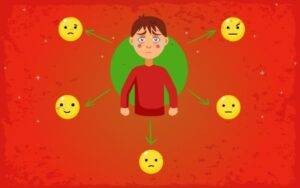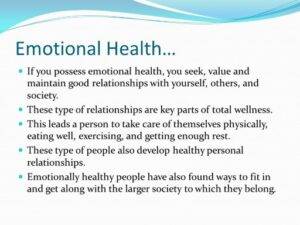What is Emotional Health?

Emotional health, often referred to as mental health or psychological well-being, is a state of well-being that allows individuals to cope with the normal stresses of life, work productively, build fulfilling relationships, and make meaningful contributions to their communities. Good emotional health encompasses various aspects, including:
Self-awareness
- Understanding one’s emotions and their triggers.
- Recognizing the link between thoughts, feelings, and behaviors.
Emotional Resilience
- The ability to bounce back from adversity.
- Coping effectively with life’s challenges and setbacks.
Positive Relationships
- Nurturing healthy connections with others.
- Communicating and resolving conflicts constructively.
Self-esteem and Self-acceptance
- Having a positive self-image and self-worth.
- Practicing self-compassion and self-care.
The Importance of Good Emotional Health
Maintaining good emotional health is crucial for several reasons:
Improved Physical Health
- Research shows that individuals with good emotional health tend to have lower rates of chronic illnesses and better immune system functioning.
Enhanced Resilience
- People with strong emotional health are better equipped to deal with life’s challenges, such as stress and trauma.
Better Relationships
- Good emotional health fosters positive interactions with others, leading to healthier and more satisfying relationships.
Greater Productivity
- Emotional well-being is linked to increased productivity and success in both personal and professional life.
Achieving and Maintaining Good Emotional Health

Self-awareness
- Keep a journal to track your emotions and identify patterns.
- Practice mindfulness and meditation to increase self-awareness.
Emotional Resilience
- Develop problem-solving skills and coping mechanisms.
- Seek support from friends, family, or a mental health professional when facing challenges.
Positive Relationships
- Build and maintain healthy relationships by being open, honest, and empathetic.
- Resolve conflicts through active listening and compromise.
Self-esteem and Self-acceptance
- Practice self-compassion and positive self-talk.
- Engage in activities that make you feel confident and proud of yourself.
Physical Health
- Exercise regularly to release endorphins and reduce stress.
- Maintain a balanced diet and get enough sleep.
Seek Professional Help
- Don’t hesitate to consult a mental health professional if you’re struggling with emotional health issues, such as anxiety or depression.
Good emotional health is a cornerstone of a fulfilling and meaningful life. It empowers us to navigate life’s challenges, build strong relationships, and thrive in our personal and professional endeavors. By developing self-awareness, emotional resilience, and positive relationships, while also taking care of our physical and mental well-being, we can achieve and maintain good emotional health. Remember that seeking professional help is a sign of strength, not weakness, and can be a crucial step in your journey toward emotional well-being. Start your journey today and experience the many benefits of good emotional health.

